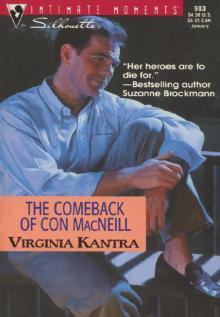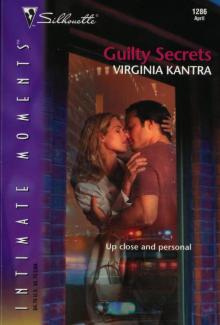- Home
- Virginia Kantra
Home Before Midnight Page 7
Home Before Midnight Read online
Page 7
“Well, of course it was a shock.” Dorothy snapped a glass down on the counter. “But I told her how it would be when she got involved with those people.”
Bailey stirred from her post by the kitchen counter. Her crossed arms lifted her shirt in front, revealing a pale slice of belly above the drawstring of her black pants.
He forced his gaze up, into her eyes.
“I don’t think Lieutenant Burke is interested in your opinion of my employers, Mom,” Bailey said.
“But I am. Very interested.”
Her gaze clashed with his. She probably thought he was a middle-aged pervert.
Maybe he was.
He cleared his throat. “You weren’t friends with Helen Ellis?” he asked Dorothy.
“Helen was all right.” Dorothy opened the refrigerator door, where plastic vegetable magnets squeezed in between family photos: a whole gallery of a towheaded boy and a curly-haired toddler in pink; several shots of a smiling blonde with various hairstyles and in different stages of pregnancy who must be Bailey’s sister; and one candid of an earnest, much younger Bailey squinting from beneath her mortarboard at the camera.
Steve narrowed his eyes. Only one?
“Although I always thought she could have done more for Bailey,” Dorothy confided, turning. “Taken her to the right places. Introduced her to the right people.” Ice rattled into a glass. “The right men.”
“I didn’t come home to Stokesville so that Helen Ellis could invite me to Saturday night dinners at the club.”
Dorothy poured his tea. “It just breaks my heart to see you waste your opportunities.”
“I am not wasting my opportunities,” Bailey said loudly. She took a deep breath. “I have a good education and a valuable research position with Paul Ellis.” She made his name sound like it was splashed in capitals on a freaking book cover. “He won the National Booksellers’ Optimus Award last year,” she told Steve, like he should know or care what that was.
Dorothy sniffed. “Paul Ellis.” The name sounded a lot different when she said it. She handed Steve a frosted glass.
“Appreciate it,” he said. “You don’t like him? Ellis?”
Bailey glared. “Don’t you have to pick up your date?”
“After I finish my tea.”
“You have a date?” Dorothy asked.
But he’d been a cop too long to let a pair of women turn an interrogation on him.
“You were saying about Paul Ellis . . . ?”
Dorothy pursed her lips. “Well, he’s Not From Around Here, is he?”
“That’s not a crime, Mom. It’s not even a bad thing. Not everyone wants to live in Stokesville all their lives.”
“There’s nothing wrong with Stokesville,” Dorothy said. “Isn’t that right, Steve?”
Teresa had never been able to stand a visit of more than a few days. Hell, there was a time when Steve himself had . . .
He shut the thought down.
“Good place to raise a family,” he said.
“Unless you have kids whose horizons stretch farther than the town limits,” Bailey said.
Irritation flicked him. What the hell did she know about it? About him.
“Do you have a lot of experience with children, Miz Wells?” he asked in a flat, dangerous voice.
“I was one. How much experience do you have with life outside Stokesville?”
She didn’t back down. He tried not to like her for that.
“Steve used to be with the Washington police department,” Dorothy answered. “Didn’t you, Steve?”
He nodded, watching Bailey.
She moistened her lips with her tongue. “State, or . . . ?”
“Metropolitan,” he told her.
Washington, D.C. Murder Capital, USA. A combustible mix of privilege, politics, and social problems, of overlapping jurisdictions and warring gangs.
Bailey’s eyes shifted and darkened as she reevaluated him. As a cop? Or as a man? he wondered, and despised himself for the question.
“How many years?” she asked.
“Twelve.” Impossible to keep the pride from his voice.
“You must miss it. It’s not like you get a lot of challenging cases in Stokesville.”
He didn’t let himself think about it. He sure as hell wasn’t going to talk about it. He sent her a slow smile, designed to distract. “There’s yours.”
But she refused to be distracted. “That doesn’t explain why you’ve come back.”
“Why did you?” he countered.
“Because of my job.”
He raised his eyebrows. “Because of Ellis, you mean.”
“They’re not involved,” Dorothy broke in. “Not romantically involved. Bailey isn’t seeing anybody now.”
Except her boss, Steve thought. But maybe her mother didn’t want to acknowledge that.
Bailey met his gaze, her dark eyes rueful. A shock of liking shivered through him. “Mom is letting you know, in her own subtle way, that I’m available.”
Maybe Bailey didn’t want to acknowledge it either.
“I have your number,” he drawled. “Maybe I’ll call.”
“I don’t think that would be such a good idea.”
“Bailey!” her mother protested.
Upset by her daughter’s lack of manners? Or her dismissal of a possible suitor?
“I’m busy,” Bailey said. “I’ve got work.”
Steve sipped his cold, too-sweet tea, observing her over the rim of his glass. “You can’t get much writing done with the house shut up.”
“I don’t write.” Her tone was too sharp. She softened it with a smile. “I run interference.”
He raised an eyebrow.
“The accident made the local news at noon,” she explained. “We’ve already received some reader response.”
Ah, crap. Walt wouldn’t want to hear that. Media attention was fine if you had a missing child or a fleeing suspect or even a traffic situation, but any speculation about Ellis’s role in his wife’s death could tip Steve’s hand. And it couldn’t help his case or his standing with his boss to have some nosy reporter stirring up Ellis’s fan base.
“What kind of response?”
She looked surprised. “Condolences, mostly. E-mails.”
“You brought a computer with you?” he asked, careful to keep his voice neutral. Removing evidence from the scene. How had he missed that?
But Bailey shook her head. “No. Paul has a laptop, of course, but I prefer a desktop. I logged on to his account from here.”
“Frank has a computer in his office,” Dorothy put in.
“I screen Paul’s mail and flag anything he needs to answer personally,” Bailey explained.
“That’s what you’ve been doing today?”
“A little. Paul’s fans like to feel they’re in the know, especially . . .”
“When it comes to crime?” Steve supplied dryly.
Bailey’s slender shoulders straightened. “I was going to say, when it’s a tragedy that affects him so personally. Most of today I’ve been handling Helen’s final arrangements. You know.”
He did know. God, he remembered. Hushed, impersonal meetings in quiet, chilly rooms with the funeral director, the florist, the organist, the priest, while his heart raged inside him like an angry child. He’d done it all without help.
He hadn’t accepted help.
Or comfort, either.
Paul Ellis’s Little Helper was watching with wide brown eyes, waiting for his reply.
He pulled himself together. “That’s what I wanted to talk with you about. The arrangements. I’ll need days and times for the viewing and the service. Was Helen a church member?”
Bailey nodded. “Saint Andrews Episcopal.”
The church-going population in Stokesville divided between the Baptists, who didn’t drink, the Episcopalians, who didn’t sing, and the Methodists who fell somewhere in between. And the Catholics, too few to matter. It figured the upwardly mobile, im
bibing Ellises attended Saint Andrews.
“Nice pew?” he guessed.
She smiled, surprising him. “Great vestments.”
“Minimal commitment.”
She shrugged. “Church was a social thing for Helen.”
“What about for her husband?”
“He attends—attended—with her sometimes.”
“And you?”
“Interested in my morals, Lieutenant?”
“Maybe I’m just making conversation,” he suggested.
“Uh huh.”
“We’ve always gone to First Methodist,” Dorothy said. “Same as your people.”
He didn’t go there anymore. But his mother did. It was another connection he might use. Another complication he didn’t want.
“What else do you need to know?” Bailey asked.
“The name of the Ellis’s lawyer.”
She was already backed against the kitchen cabinets with her arms across her chest. But her chin came up at that. “Does he need one?”
He’d been angling for a reaction. Hell, this whole visit was a fishing expedition. She was hooked, no doubt about it. That didn’t mean he had to enjoy watching her squirm.
“I want to talk to Helen’s executor,” he explained. “Who’s handling her estate?”
“Oh.” Bailey’s face cleared. “Pierce and Reynolds, here in town. Does that help?”
It could. Especially if he found out Helen Stokes Ellis had left a whopping pile to her husband.
His cell phone vibrated. He glanced down at the caller’s number. Gabrielle.
Shit.
“Is something wrong?” Bailey asked.
Yeah. He checked his watch. He was late, and his daughter was going to be furious. Or worse, disappointed.
He was supposed to do better. He had to do better.
“Nope,” he lied. “But I have to go.”
Mother and daughter stared. He could trace their family resemblance in the narrow, oval shape of their faces, in their nearly identical fine-boned frames.
The reminder of what he had lost, of what he had left to lose, swept over him.
“Thanks for the tea,” he said, and was gone.
“WELL.” Dorothy huffed in disappointment. “He certainly left in a hurry.”
Your fault, her look said. Men never leave your sister.
Bailey shrugged. “So we were lucky this time.”
“You could have at least tried to stop him.”
“Mom.” Bailey regarded her petite, attractive mother with exasperated affection. Burke was investigating her. But in her mother’s world, male attention was always a good thing. “The guy is six feet four and built like a line-backer. Not to mention he carries a gun. I couldn’t even slow him down.”
“A woman has ways,” Dotty said.
“Some women, maybe.”
“You know, Bailey, honey, you’re not bad-looking. If you’d just make an effort—”
“I don’t want to make an effort. I’m happy the way I am.”
Happy enough.
“The right man could make you happier.”
“Steve Burke is not the right man.”
She’d already met the right man. At least, she’d thought she had. When Paul Ellis smiled at her on his way into his editor’s office, when he sent flowers after she completed an exhaustive line edit, when he plucked her from her miserable corner at the Christmas cocktail party, Bailey had felt like Cinderella attracting the notice of the prince. Paul was more than charming. He was educated, urbane, sophisticated, successful . . .
And married, she learned later.
Had been married. He was widowed now.
Oh, God. Guilt scorched in her cheeks and burned in her stomach. She was absolutely going to hell.
“What’s the matter with him?” Dorothy demanded.
Him? Bailey pulled her thoughts together. Oh, Burke. “He’s too . . .”
“Too what?”
Too large. Too harsh. Too aggressively masculine, with his hard, cop’s eyes and broad, muscled body.
Bailey had already battered her heart and bruised her ego fishing the pool of available men in New York. It was better—safer—to nurse a crush on her married boss than to risk her heart, her health, and her sanity on another disappointment. At least with Paul, she knew the limits of their relationship up front. At least Paul appreciated her.
“Well, for one thing, he lives here,” Bailey said.
“So do you.”
“Only temporarily. I could never get involved with a man who expected me to stay.”
Dorothy sniffed. “You mean, like Paul Ellis does?”
Bailey’s mouth dropped open. She snapped it shut. She didn’t expect her mother to be perceptive. She didn’t want her to be right. “I don’t have time for this.”
“Exactly,” Dorothy said. “You’re twenty-six years old. Almost twenty-seven. When your sister was your age, she was already pregnant with Bryce, Junior.”
And pasting her perfect life into even more perfect photo albums. Which was fine, if that was her sister’s dream. It had never been Bailey’s.
Not that she had anything against kids. But in her adolescent dreams, she’d always imagined herself creating new fictional worlds. Writing books, not editing scrapbooks.
“Can we please put off the biological clock discussion until dinner? I need to get back to work.”
“And that attitude doesn’t help you any. No man wants to compete with a woman’s work schedule. Why, your father—”
Bailey’s cell phone played the opening bars of “The Trouble With Love Is” from her pocket.
Reprieved. She snatched it out. “Hello?”
“Thank God you’re there.” Paul’s voice flowed, warm and fervent, over the line. If she’d been less distracted by her mother, less annoyed by Lieutenant I-Have-A-Prior-Engagement, her heart would have leaped. “Bailey, I need you. I’m in trouble.”
Anxiety clenched her chest. She forced herself to breathe deeply. To speak calmly. To think.
Steve had just left her mother’s house. Had he even had time to drive to the Do Drop and make an arrest?
“Have you called a lawyer?” she asked.
“What are you talking about? I called Feinstein in New York, but he won’t be in until tomorrow.”
Feinstein was Paul’s doctor.
“Are you all right?” Bailey asked.
“Of course I’m not all right,” Paul said. “That’s what I’m telling you. My Xanax is in the house, and I can’t reach Feinstein for a new prescription. I need you to get it for me.”
Relief washed over her in a warm tide. Relief and shame that she had ever doubted him. Only for a second, but the twinge lingered like the residual ache after a dentist appointment. It was Burke’s fault, she decided, poking in where he wasn’t wanted, prodding her with his questions and his bold, black eyes.
“Sorry,” she said. “I’ll call the pharmacy.”
“You’re not listening,” Paul chided. “The prescription can’t be refilled. I need you to get my pills from the house.”
Can’t be refilled? How much had he been taking?
But of course she couldn’t ask him that. Not when he was under so much stress.
She turned to the counter, hunching her shoulders so she wouldn’t have to see her mother’s avid eyes and disapproving mouth. “Won’t there be an officer on duty at the house?”
“You think I should ask him to go through my medicine cabinet and get my drugs for me?”
Bailey’s flush deepened. Paul could be such an asshole. “I meant . . . What if he objects to my being there?”
“He can’t. It’s my house. You’re my assistant. If he doesn’t like it, I’ll revoke my consent to search. I won’t be inconvenienced because some stupid cop is hunting for evidence of an intruder when it’s perfectly plain to the chief and everyone else that Helen drowned.”
Bailey suspected Steve Burke wasn’t stupid at all. Twelve years with the Metropol
itan police force. But that wasn’t what Paul needed to hear right now.

 Meg and Jo
Meg and Jo All a Man Can Do
All a Man Can Do THE COMEBACK OF CON MACNEILL
THE COMEBACK OF CON MACNEILL All a Man Can Be
All a Man Can Be MAD DOG AND ANNIE
MAD DOG AND ANNIE![Dare Island [2] Carolina Girl Read online](http://i1.bookreadfree.com/i/03/26/dare_island_2_carolina_girl_preview.jpg) Dare Island [2] Carolina Girl
Dare Island [2] Carolina Girl Forgotten Sea
Forgotten Sea Sea Lord
Sea Lord THE PASSION OF PARICK MACNEILL
THE PASSION OF PARICK MACNEILL All a Man Can Ask
All a Man Can Ask Home Before Midnight
Home Before Midnight Family Secrets: Books 5-8
Family Secrets: Books 5-8 Carolina Dreaming: A Dare Island Novel
Carolina Dreaming: A Dare Island Novel Carolina Home
Carolina Home GUILTY SECRETS
GUILTY SECRETS Carolina Blues
Carolina Blues Carolina Man
Carolina Man Carolina Man (A Dare Island Novel)
Carolina Man (A Dare Island Novel) STOLEN MEMORY
STOLEN MEMORY Carolina Heart
Carolina Heart Immortal Sea
Immortal Sea THE TEMPTATION OF SEAN MCNEILL
THE TEMPTATION OF SEAN MCNEILL Sea Fever
Sea Fever